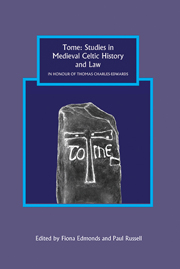Book contents
- Frontmatter
- Contents
- List of Illustrations
- Preface
- List of Contributors
- Abbreviations
- 1 Cloud-Cuckoo Land? Some Christian Symbols from Post-Roman Britain
- 2 Columbanus's Monasticism and the Sources of his Inspiration: From Basil to the Master?
- 3 Early Irish Priests within their Own Localities
- 4 Political Organisation in Dál Riata
- 5 Irish Boundary Ferta, their Physical Manifestation and Historical Context
- 6 Asser's Parochia of Exeter
- 7 Viking-Age Sculpture in North-West Wales: Wealth, Power, Patronage and the Christian Landscape
- 8 Iona v. Kells: Succession, Jurisdiction and Politics in the Columban Familia in the Later Tenth Century
- 9 A Twelfth-Century Indulgence Granted by an Irish Bishop at Bath Priory
- 10 Gerald of Wales, Gildas, and the Descriptio Kambriae
- 11 Patrick's Reasons for Leaving Britain
- 12 Learning Law in Medieval Ireland
- 13 Holding Court: Judicial Presidency in Brittany, Wales and Northern Iberia in the Early Middle Ages
- 14 The Iorwerth Triads
- 15 The Recovery of Stolen Property: Notes on Legal Procedure in Gaelic Ireland, Scotland and the Isle of Man
- 16 Contentious Kinship: The Penumbra of Established Kinship in Medieval Irish Law
- 17 Marriage by Purchase in Early Irish Law
- 18 Kingship Made Real? Power and the Public World in Longes Mac nUislenn
- 19 Mongán's Metamorphosis: Compert Mongáin ocus Serc Duibe Lacha do Mongán, a Later Mongán Tale
- Bibliography of the Writings of Thomas Charles-Edwards Maredudd ap Huw
- Index
- Tabula Gratulatoria
3 - Early Irish Priests within their Own Localities
Published online by Cambridge University Press: 05 October 2013
- Frontmatter
- Contents
- List of Illustrations
- Preface
- List of Contributors
- Abbreviations
- 1 Cloud-Cuckoo Land? Some Christian Symbols from Post-Roman Britain
- 2 Columbanus's Monasticism and the Sources of his Inspiration: From Basil to the Master?
- 3 Early Irish Priests within their Own Localities
- 4 Political Organisation in Dál Riata
- 5 Irish Boundary Ferta, their Physical Manifestation and Historical Context
- 6 Asser's Parochia of Exeter
- 7 Viking-Age Sculpture in North-West Wales: Wealth, Power, Patronage and the Christian Landscape
- 8 Iona v. Kells: Succession, Jurisdiction and Politics in the Columban Familia in the Later Tenth Century
- 9 A Twelfth-Century Indulgence Granted by an Irish Bishop at Bath Priory
- 10 Gerald of Wales, Gildas, and the Descriptio Kambriae
- 11 Patrick's Reasons for Leaving Britain
- 12 Learning Law in Medieval Ireland
- 13 Holding Court: Judicial Presidency in Brittany, Wales and Northern Iberia in the Early Middle Ages
- 14 The Iorwerth Triads
- 15 The Recovery of Stolen Property: Notes on Legal Procedure in Gaelic Ireland, Scotland and the Isle of Man
- 16 Contentious Kinship: The Penumbra of Established Kinship in Medieval Irish Law
- 17 Marriage by Purchase in Early Irish Law
- 18 Kingship Made Real? Power and the Public World in Longes Mac nUislenn
- 19 Mongán's Metamorphosis: Compert Mongáin ocus Serc Duibe Lacha do Mongán, a Later Mongán Tale
- Bibliography of the Writings of Thomas Charles-Edwards Maredudd ap Huw
- Index
- Tabula Gratulatoria
Summary
The early-eighth-century collection of canons known as Collectio Canonum Hibernensis includes a book entitled On presbyters and priests. Chapter twenty-five deals with correct punishment to be meted out to priests who are absent from their locality:
Sinodus Hibernensis decrevit, ut sacerdos una tantum die ab ecclesia defuerit; si duobus, peniteat VII diebus cum pane et aqua; si autem mortuus ad ecclesiam adlatus fuerit et ille absens, penitere debet quia poenae reus illius est. B. Item: Si in uno die dominico ab ecclesia defuerit, agat penitentiam XX dierum cum pane et aqua, si autem duobus aut tribus, submovendus honore gradus sui.
This is a relatively rare example of concern about a priest's relationship with his congregation in this particular source. The other twenty-six chapters in the book concern the nature of the priest's role, their Old Testament precursors, the nature of sacrifice, the rituals of ordination and (by far the greatest area of concern, with ten separate chapters) the rules governing clerical income.
The evidence for the duties and functions of priests and their role in Irish society is not limited to On presbyters and priests, but can also be found scattered through other books within the Collectio. In Book twenty-one, for example, On judgement, a priest is identified as a suitable person to be a judge, along with fourteen other characters including a bishop, a king, a legal scholar, a kinsman (on issues concerning his own kin), a craftsman (on matters pertaining to his own craft), the old, the poor and the wise.
- Type
- Chapter
- Information
- Publisher: Boydell & BrewerPrint publication year: 2011



